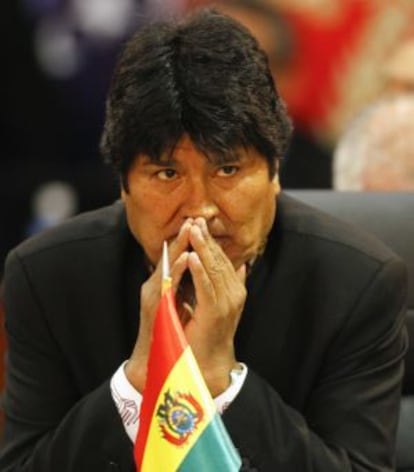"We are not interested in good relations with the US"

He doesn't sleep for more than four hours. What is his secret? The short naps he takes on the plane when he travels from corner to corner across Bolivia. "I sleep a little, and then I am wide awake," says Evo Morales Ayma.
It is difficult to match the stamina of the 52-year-old Morales, who became Bolivia's first indigenous president and has fought tooth-and-nail to transform his Andean country.
Question. After six years in government, what have been your most successful measures and your biggest failure?
Answer. The problem that still pains me the most was the violent confrontation in 2006 that took place in Huanuni between miners from different cooperatives and the government, which left more than 10 people dead and wounded. It wasn't a struggle against the government or state, but a conflict between miners who fought each other with dynamite. And, of course, the removal of government subsidies for gasoline products.
Q. The construction of a highway through the Isiboro Securé National Park in Amazonia has sparked major protests of indigenous organizations and longtime supporters of yours.
A. It is not a new project. I believed that I was following my mandate to integrate and open three points of entry and exit from the Amazon region to the high plains and from the high plains to the Amazon region through Santa Cruz, La Paz and Cochabamba. This is integration. But a group of brother Indians has joined rightwing elements in this country to launch a great opposition strategy, using the pretext that they are protecting the environment. I am convinced that with this referendum we are planning to hold, the people will eventually say: "Let's build this road."
Q. There are reports by the UN that indicate that there are thousands of hectares of coca leaf farms that exceed the authorized limit for local and legal consumption. Where is this extra coca going?
Firms that invest and comply with agreed conditions will be respected"
A. In the Tropic of Cochabamba there is a conscientious effort to reduce coca harvesting because people know that a big portion of it is destined for illegal production. They have taken this decision voluntarily without forced eradication or anyone in the rural areas getting killed for this. There is no such thing as free coca harvesting but again, you cannot altogether eliminate it. But there is a permanent reduction.
Q. How are bilateral relations between Bolivia and the United States?
A. Bad, but we don't want to have good relations either; we are not interested. We have started to become economically independent and for that reason we don't need the United States. Where was Bolivia for many years when it was allied with the United States? It was the second-to-last country in the Americas. In a short time, we have grown; we have thrown out the ambassador; we closed the US military base; and we expelled the DEA. We are better off without the United States.
Q. So there is no chance of restoring normal relations with the United States?
A. Hmmm. It would be best not to have them.
Q. Do you plan on any more nationalizations, such as the recent case of Red Eléctrica de España (REE), and to what extent can you guarantee the safety of foreign investments in Bolivia?
A. All of the firms that invest in Bolivia and comply with agreed conditions will be respected. But there are companies, such as Red Eléctrica de España, that don't invest. REE made a minimal $5-million investment. We have excellent relations with Repsol; they are a good partner and provide good services.
Tu suscripción se está usando en otro dispositivo
¿Quieres añadir otro usuario a tu suscripción?
Si continúas leyendo en este dispositivo, no se podrá leer en el otro.
FlechaTu suscripción se está usando en otro dispositivo y solo puedes acceder a EL PAÍS desde un dispositivo a la vez.
Si quieres compartir tu cuenta, cambia tu suscripción a la modalidad Premium, así podrás añadir otro usuario. Cada uno accederá con su propia cuenta de email, lo que os permitirá personalizar vuestra experiencia en EL PAÍS.
¿Tienes una suscripción de empresa? Accede aquí para contratar más cuentas.
En el caso de no saber quién está usando tu cuenta, te recomendamos cambiar tu contraseña aquí.
Si decides continuar compartiendo tu cuenta, este mensaje se mostrará en tu dispositivo y en el de la otra persona que está usando tu cuenta de forma indefinida, afectando a tu experiencia de lectura. Puedes consultar aquí los términos y condiciones de la suscripción digital.








































